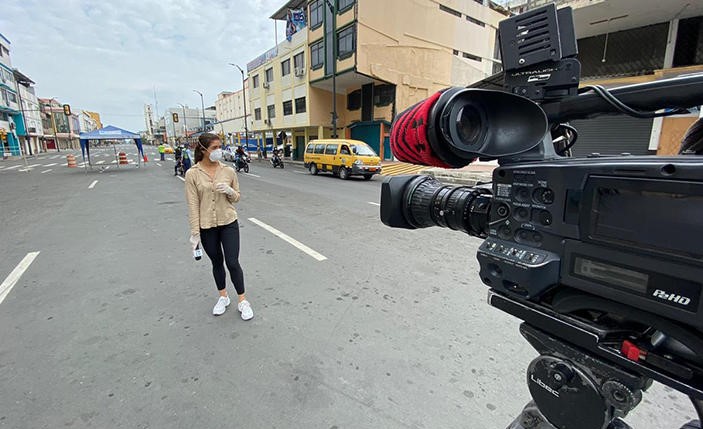Image:Journalist Dayanna Monroy covers the COVID-19 pandemic in Ecuador. (Courtesy of Dayanna Monroy/CPJ)
15 April 2020.
In the light of the COVID-19 pandemic, the undersigned chairs and members of the Groups of Friends on the Safety/Protection of Journalists are calling on all states to protect journalists’ and media workers’ safety, safeguard a free and independent media and ensure unhindered access to information, both online and offline.
Free, independent and pluralistic media play an indispensable role in informing the public during the ongoing COVID-19 crisis. Everyone has the right to comprehensible, accessible, timely and reliable information concerning the nature and level of the threat COVID-19 poses to their health, allowing them to follow evidence-based guidance on how to stay safe.
Public health needs public trust. Trust is crucial to achieving adequate support for and compliance by the general public with efforts by governments to help curb the spread of the virus.
Trust cannot be achieved without transparency and accountability provided and guaranteed by a free media. Conversely, free and independent media has an important role in pushing back against disinformation by providing access to accurate, fact-based and verified information. In this context, it is essential that governments and private entities address disinformation, foremost, by providing reliable information themselves.
We see with great concern an increase in restricting measures taken by States that disproportionately limit the right to freedom of expression and impede journalists and media workers from reporting on the COVID-19 crisis. Arrests, persecution and harassment against journalists and media workers, especially women, as well as smear campaigns to discredit their work and the expulsion of foreign journalists due to their COVID-19 coverage or the criminalisation of alleged misinformation, online and offline, may constitute human rights violations. There should be no place for impunity in democratic societies.
Internet access is essential to ensuring that information reaches those affected by the virus. Governments should end any internet shutdowns, ensure the broadest possible access to internet services, and take steps to bridge digital divides, including the gender gap.
Furthermore, journalists and media workers are subjected to significant physical and psychological risk by being at the frontline reporting on the COVID-19 crisis. They are working under extremely challenging conditions, partly because of lack of sanitary precautions and training, but also because of psychological stress linked to the rapidly evolving situation. Declarations of state of emergency due to the COVID-19 pandemic should not be used as a basis to limit freedom of expression and constrain the working environment of journalists and media workers. It is crucial for societies and the international community as a whole that governments preserve a free, safe and enabling environment for journalists and media workers and ensure that they can report on COVID-19 and inform about responses and consequences without undue interference.
We welcome a range of initiatives aimed at supporting journalists’ and media workers’ safety in the light of COVID-19 undertaken by international organisations, such as UNESCO and civil society, media associations as well as social media companies. Projects to strengthen media in developing countries in responding to the COVID-19 crisis, such as those undertaken by the UNESCO International Programme for the Development of Communication, are particularly welcome.
We also welcome the joint statement of 19 March published by David Kaye, UN Special Rapporteur on the promotion and protection of the right to freedom of opinion and expression; Harlem Désir, OSCE Representative on Freedom of the Media; and Edison Lanza, Special Rapporteur for Freedom of Expression of the Inter-American Commission on Human Rights as well as the press release and statements made by Moez Chakchouk, UNESCO Assistant Director-General for Communication and Information, published on 27 March.
We agree with their call that governments must be making exceptional efforts to protect the work of journalists at a moment of public health emergency and we remain fully committed to protecting media freedom and safety of journalists at this critical time.
Signed by Austria, France, Greece, Lithuania and Sweden as the chairs and co-chairs, respectively, of the Groups of Friends on the Safety of Journalists in New York, Geneva, Vienna (OSCE) and Paris.
List of co-signatories, members in any of the four Groups of Friends on the Safety of Journalists at UNESCO in Paris, the United Nations in New York and Geneva and the OSCE in Vienna, in alphabetical order:
Albania
Argentina
Australia
Austria
Brazil
Bulgaria
Canada
Cape Verde
Chile
Costa Rica
Denmark
Estonia
Finland
France
Germany
Ghana
Greece
Japan
Kenya
Kuwait
Latvia
Lebanon
Lithuania
Luxembourg
Montenegro
Morocco
The Netherlands
Nigeria
Norway
Paraguay
Poland
Qatar
Republic of Korea
Senegal
Slovenia
Sweden
Switzerland
Tunisia
United Kingdom
United States
Uruguay
